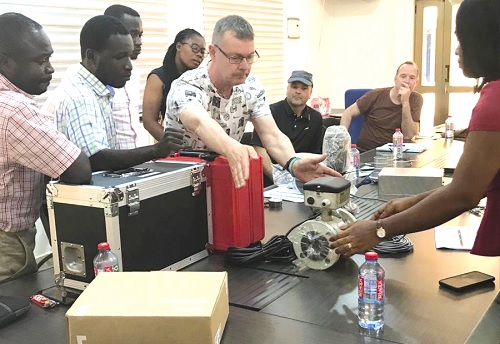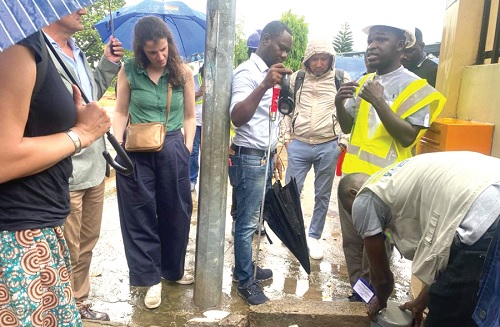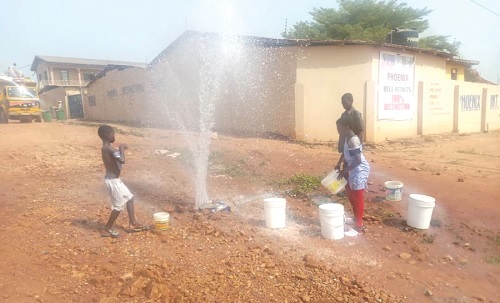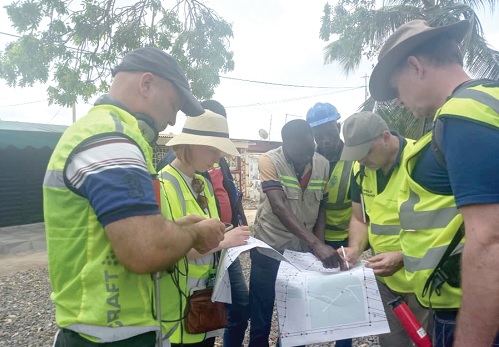
Non-revenue water: Threat to water security
From afar, I thought it was a shower.
Several children were seen cooling off under the high-rising water.
Advertisement
Others had buckets with which they collected the falling water for domestic use.
But when I got closer, it dawned on me that the water was gushing out from a burst pipeline.
The burst pipe was across the road near the Phoenix International School, located at Agape Container, Ablekuma in the Ga South Municipality.
When I got there around 10 a.m., on December 23, 2023, the road leading from the Agape Container to the Pentecost Junction was inundated with running water in volumes that would make one think there had been a downpour.
“We saw the water gushing out this dawn so many people took advantage of it and started collecting it for storage at home,” 27-year-old Mary Obiri Yeboah said.

GWCL and Aarhus Vand staff inspecting equipment and materials at GWCL workshop on leakage detection in Ashaiman
The phenomenon of burst pipelines is common in Accra and many parts of the country. In many cases, pipelines laid across roads burst from daily friction brought on by vehicles use of the roads.
Also, construction activities expose the pipelines and cause them to burst.
A Civil Engineer and Manager of Non-Revenue Water (NRW) at the GWCL, Maxwell Akosah-Kusi, described the development as disheartening, because while the company struggled to bridge the gap between the demand and supply of water, water loss, otherwise called non-revenue water (NRW), was aggravating the situation.
“Most of the time, we drive through town and see water gushing out through leaking pipes, and the situation is so worrying because, for every one of such incidents, there are probably 10 more that we do not see that is seeping into the ground,” he said.
Non-revenue water
NRW is the difference between the amount of water supplied into a distribution system and the amount of water that is billed to the customers.
NRW consists of apparent losses, real losses and unbilled authorised consumption.
Apparent losses, also called commercial losses, are caused by inaccurate metering, data handling errors, theft and unknown connections, while real losses (physical losses) cover leakages from all parts of the system and overflows at storage tanks.

It was a field day for these children as they bathed and fetched water gushing out of a burst pipeline at the Phoenix International School at Agape Container, Ablekuma
Real losses result from poor operations and maintenance, as well as poor quality of the underground assets.
On the other hand, unbilled authorised consumption is water that is used for flushing and firefighting and water provided free to certain customer groups.
The World Bank estimates that globally, 32 billion cubic meters of water are physically lost every year, with half of it occurring in developing countries.
The bank indicates that while water utilities suffer from the huge financial costs of treating and pumping , leakages result in water that could have been sold to generate more revenue.
It adds that if water losses in developing countries were halved, the saved water would be enough to supply about 90 million people.
Ghana’s situation
According to Mr Akosah-Kusi, about 65 per cent of the NRW in the country resulted from physical losses and 35 per cent was due to apparent losses.
He disclosed that nationally, the GWCL produced 320 million cubic metres (m3) of water a year, but 42 per cent of the total volumes of water produced is lost.
“Currently, we are unable to bill 42 per cent of the water we produce nationwide, and nearly 70 per cent of all the water losses in the country happen in Accra and Kumasi, because these two cities have a chunk of the water distribution network,” he said.
The civil engineer explained that out of the country’s 12,000 kilometres (KM) of pipeline, Accra alone had over 4,000 km, while Kumasi had about 2,500 km.
He said water losses through burst pipes were a common phenomenon in the country as some of the materials used for the pipelines were quite old, making them wear and tear when they were under high pressure.
Again, he indicated that construction activities, especially indiscriminate building and excavation result in the cutting of pipelines.
“Water theft is also happening all around. People connect illegally to our pumps and use water from our system.
Sometimes when we find them, they are arrested and surcharged to pay, but the situation persists,” he added.
Why must we be worried?
The United Nations (UN) estimates that globally, water consumption will increase by 30 per cent by 2050, leading to an even widened supply gap for countries already suffocating from water stress.
It further estimates that without scaled-up interventions, demand for water will outstrip known freshwater resources by 40 per cent in less than 15 years.
For Ghana, the situation is worrying because the GWCL is struggling to meet the water demand and supply gap.

GWCL staff explaining the process of leakage detection to the EU Sustainable Cities Team, during a visit to Tema
While the national demand for water is 321 million gallons per day, the GWCL currently produces 199 million gallons, leaving a deficit of 122 million gallons.
If the country’s 42 per cent rate of NRW is anything to go by, it means 134.8 million gallons of what the GWCL produces daily is lost.
Even more, while it costs the GWCL GH₵1.2 billion annually to produce water, the company continues to lose 42 per cent of expected revenues.
Dealing with NRW
In 2019, the governments of Ghana and Denmark entered into a strategic sector cooperation through the cities of Tema and Arhus, on how water can be managed generally as part of climate adaptation.
The water component of the cooperation is focused on reducing NRW by plugging leakages, improving infrastructure and the distribution network, as well as wastewater management, climate adaptation and stormwater drainage.
As part of measures to reduce NRW, the GWCL subsequently collaborated with the Tema Metropolitan Assembly (TMA) and the Arhus team, focusing on checking for leakages, burst registration and repairs of ageing networks.
Through the project, a capacity-building programme has been designed to train some staff of the company on a Danish leakage detection technology known as zero point measurement.
Mr Akosah-Kusi said the company had been supported to acquire equipment and build a data system to actively search and be able to pinpoint leakages to specific pipelines.
He explained that some officers of the GWCL were now adept at the Danish leakage detection technology and had worked to reduce NRW in some communities in Tema.
“When we started the project in Tema, NRW was 52 per cent, exceeding the 42 per cent national rate; but it has reduced to 44 per cent now,” he said.
Mr Akosah-Kusi also said the GWCL was mapping all its pipelines across the country on the geographic information system (GIS) to facilitate asset management.
“We have done more than 12,000 km of pipeline and we expect that by the end of 2024, we will have mapped all our assets,” he said.
He said the company had also introduced electronic billing in an attempt to reduce the administrative errors that led to water losses while drones had also been introduced to facilitate the reading of metres.
This strategic cooperation between Arhus and TMA needs to be scaled up to other parts of the country to help reduce NRW.
As good citizens, let us report incidents of burst pipes to the GWCL.
Writer’s E-mail: [email protected]




